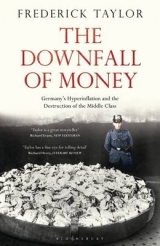The Downfall of Money
Germany’s Hyperinflation and the Destruction of the Middle Class
Seiten
2013
Bloomsbury Publishing PLC (Verlag)
978-1-4088-3991-1 (ISBN)
Bloomsbury Publishing PLC (Verlag)
978-1-4088-3991-1 (ISBN)
- Titel ist leider vergriffen;
keine Neuauflage - Artikel merken
Many theorists believed a hundred years ago, just as they did at the beginning of our twenty-first century, that the world had reached a state of economic perfection, a never before seen condition of beneficial human interdependence that would lead to universal growth and prosperity. And yet the early years of the Weimar Republic in Germany witnessed the most complete and terrifying unravelling of a major country's financial system to have occurred in modern times.
The story of the Weimar Republic's financial crisis has a clear resonance in the second decade of the twenty-first century, when the world is anxious once more about what money is, what it means and how we can judge if its value is true. The Downfall of Money will tell anew the dramatic story of the hyperinflation that saw the once-solid German mark, worth 4.2 to the dollar in 1914, trading at over four trillion by the autumn of 1923. It is a trajectory of events uncomfortably relevant for today's uncertain world.
The Downfall of Money will reveal the real causes of the crisis, what this collapse meant to ordinary people, and also trace its connection to Germany's subsequent catastrophic political history. By drawing on a wide range of sources and making sense for the general reader of the vast amount of specialist research that has become available in recent decades, it will provide a timely, fresh and surprising look at this chilling period in history.
The story of the Weimar Republic's financial crisis has a clear resonance in the second decade of the twenty-first century, when the world is anxious once more about what money is, what it means and how we can judge if its value is true. The Downfall of Money will tell anew the dramatic story of the hyperinflation that saw the once-solid German mark, worth 4.2 to the dollar in 1914, trading at over four trillion by the autumn of 1923. It is a trajectory of events uncomfortably relevant for today's uncertain world.
The Downfall of Money will reveal the real causes of the crisis, what this collapse meant to ordinary people, and also trace its connection to Germany's subsequent catastrophic political history. By drawing on a wide range of sources and making sense for the general reader of the vast amount of specialist research that has become available in recent decades, it will provide a timely, fresh and surprising look at this chilling period in history.
Frederick Taylor was educated at Aylesbury Grammar School, and read History and Modern Languages at Oxford, and did postgraduate work at Sussex University. He edited and translated The Goebbels Diaries and is the author of the acclaimed Dresden, The Berlin Wall and Exorcising Hitler. He lives in Cornwall.
| Erscheint lt. Verlag | 12.9.2013 |
|---|---|
| Verlagsort | London |
| Sprache | englisch |
| Maße | 153 x 234 mm |
| Gewicht | 792 g |
| Themenwelt | Geschichte ► Allgemeine Geschichte ► Neuzeit (bis 1918) |
| Geschichte ► Allgemeine Geschichte ► 1918 bis 1945 | |
| Geisteswissenschaften ► Geschichte ► Regional- / Ländergeschichte | |
| Wirtschaft ► Betriebswirtschaft / Management ► Finanzierung | |
| Wirtschaft ► Volkswirtschaftslehre ► Finanzwissenschaft | |
| ISBN-10 | 1-4088-3991-1 / 1408839911 |
| ISBN-13 | 978-1-4088-3991-1 / 9781408839911 |
| Zustand | Neuware |
| Haben Sie eine Frage zum Produkt? |
Mehr entdecken
aus dem Bereich
aus dem Bereich
Giordano Bruno - ein ketzerisches Leben
Buch | Hardcover (2024)
C.H.Beck (Verlag)
CHF 41,85
das dramatische 16. Jahrhundert
Buch | Hardcover (2024)
Rowohlt Berlin (Verlag)
CHF 47,60




